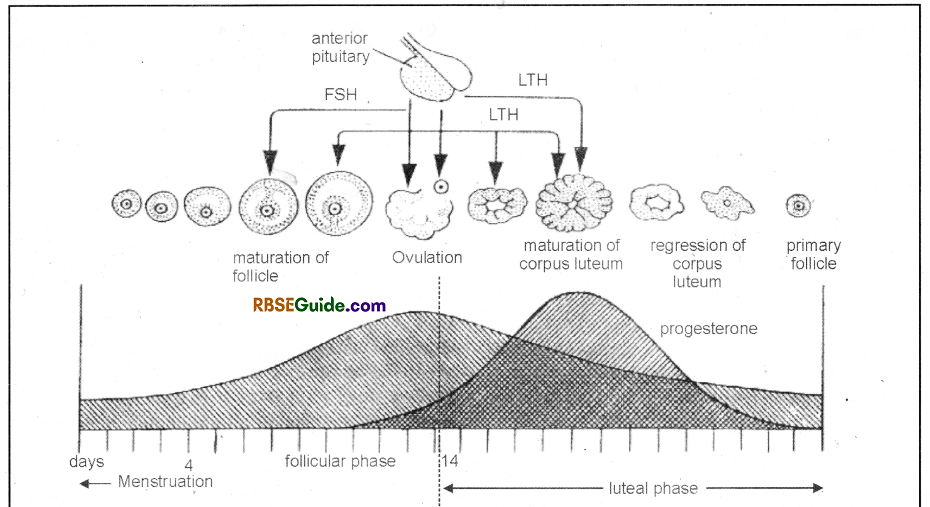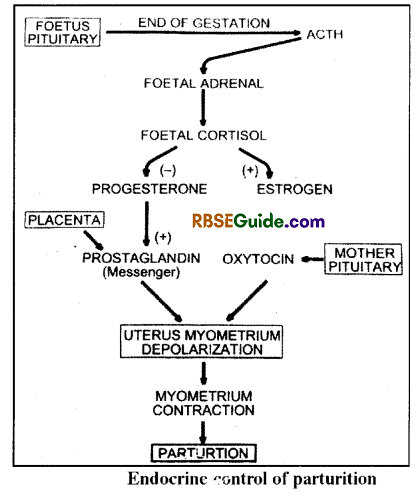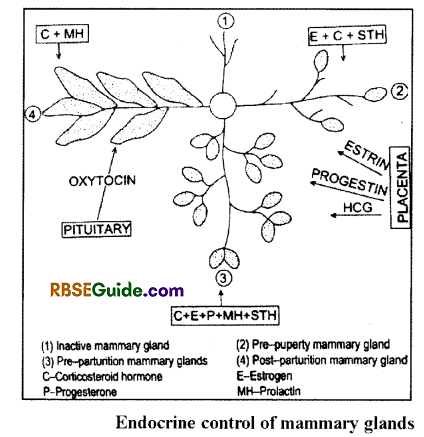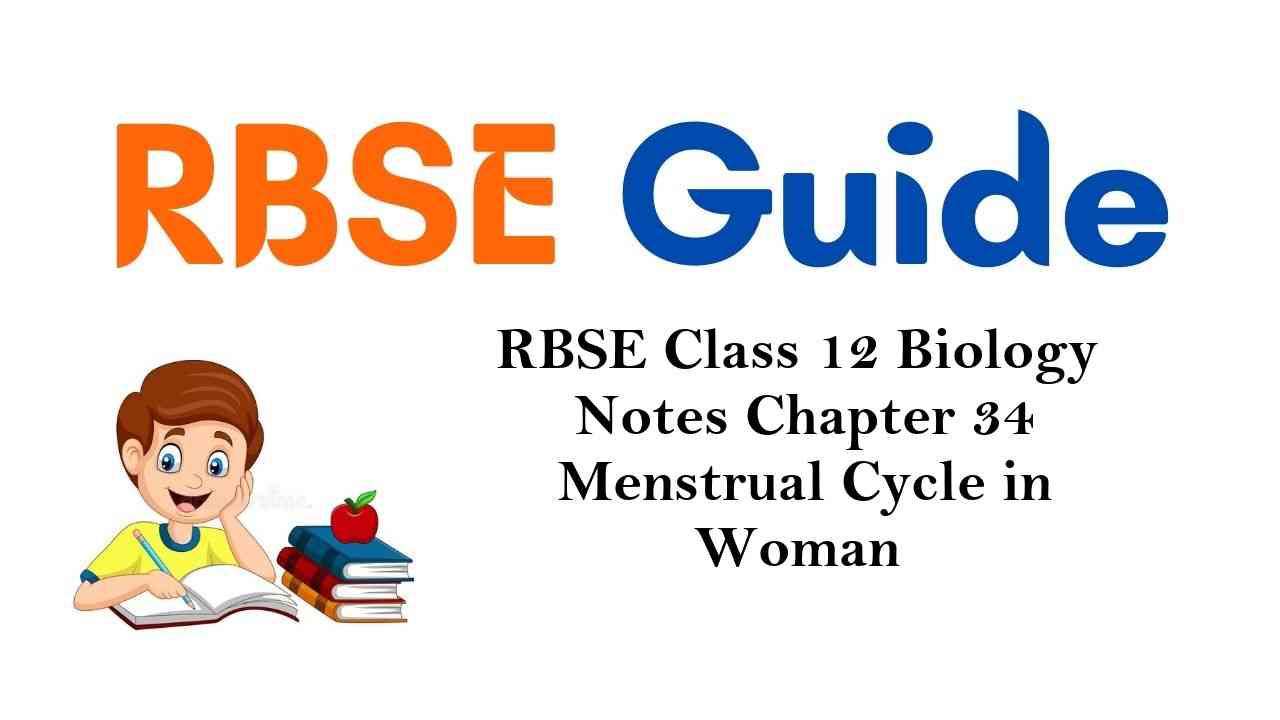Rajasthan Board RBSE Class 12 Biology Notes Chapter 34 Menstrual Cycle in Woman
General
Reproductive events in mammalian females occur in a cyclic sequence which is called as reproductive or ovarian cycle.
The reproductive cycles are of two types:
- cycle
- Menstrual cycle
![]()
Cycle
It is exhibited by all eutherian mammalian females except the order primata.
The mammalian females which exhibit one estrus cycle in one breeding season are called as monoestrous.
Example: Dogs, Fox, Bats, Deer etc
The mammalian females which exhibit two or more estrous cycles in one breeding season are called as polyestrous. Example: Rat, squirrel, cow, pig, horse, cat, sheep rabbit etc.
The estrous cycle is studied with the help of vaginal smears.
The duration of various phases of the estrous cycle varies from species to species. In rat, it is of 4 to 5 days and in rabbit is 16 to 17 days.
The estrous cycle has 4 phases:
(i) Diestrus phase:
- It is also called as anestrus phase.
- It is the longest phase & its duration is of 60 to 70 hours. .
- The ovary is without Graffian follicles.
- The uterine gland is thin, small & inactive.
- The vaginal smear shows leucocytes.
- During non-breeding season the female remains in diestrus phase.
(ii) Proestrus phase:
- It is the smallest phase. It’s duration is 1/2 to 5 hours.
- There is no growth of ovarian follicles.
- Vaginal smear exhibits epithelial cells.
- The uterine glands begin to increase in number & size.
- The thickness & contractability of the uterine wall begin to increase.
(iii) Estrous phase:
- It’s duration in rat is 9 to 15 hours.
- It is also called as heat period. I
- The basal temperature of the body is increased.
- Formation of Graffian follicles in the ovary.
- Vaginal smear shows the presence of cornified cells
- Maximum level of estrogen in the blood.
- Ovulation takes place.
(iv) Post Estrus or metestrus phase:
- It’s duration is of 10 to 14 hours.
- The vaginal smear shows cornified cells & leucocytes.
- Maximum level of progesterone in the blood. Formation of Corpus luteum in the ovaries,
- If there is fertilization, the female remain in metestrous till the parturition.
- The estrous cycle repeats if there is no fertilization and after parturition.
![]()
Menstrual cycle
It is found only in primate females.
It’s duration is 28 to 30 days in woman and 35 days in chimpanjee.
In woman, the menstrual cycle begins at an age of 12 years which is called as menarche. The menstrual cycle ceases naturally at an age of 45 to 50 years which is called as menopause.
The menstrual phase has 4 phases viz.:
(i) Menstrual phase:
- It’s duration is of 3 to 5 days in woman.
- Term menstruation means bleeding. During this phase, the blood is released along with dead ovum & pieces of uterine endometrium.
- The ovary has immature follicles & corpus albicans.
- Body has less estrogen & the progesterone is almost absent.
(ii) Follicular phase or Proliferative phase:
- It’s duration is of 8 to 10 days.
- Maximum estrogen in the blood.
- Formation of Graffian follicles up to the end o this phase.
- Increased thickness of uterine wall and increased number of uterine B.Vs. & uterine glands.
- Blood FSH is increased but blood LH is reduced.
(iii) Ovulatory phase or recovery phase:
- There is ovulation which occurs 14th +2 day in woman.
- The ovary has burst Graffian follicle.
- FSH & Estrogen get lowered slightly.
- Increase in the body temperature.
(iv) Luteal phase or secretory phase:
- It is also called as pre-menstrual phase.
- It is the longest phase. It’s duration in woman is 12 to 16 days.
- The ovaryr shows fully developed corpus luteum.
- Myomatrium & endomatrium are maximum developed.
- Maximum estrogen, progesterone & LH in the blood.
- Uterine glands are completely developed & corkscrew shaped.
- The female remains in luteral phase till parturition.
- If there is no fertilization, the menstrual cycle is repeated.


![]()
Parturition
In rabbit, man & other eutherians embryonic development completes in the uterus which is followed by the birth of young ones. It is called as parturition.
The duration between the fertilization & the parturition is called as gestation.
The gestation is different in. the different species. In rabbit, it is of 28 – 30 days and in man is 270 to 280 days.
In rabbit, the young ones are hairless, blind & deaf. They become normal in 5 to 7 days.
Parturition is a hormonal process which involves many hormones. At the completion of the embryonic development, the pituitary increases the secretion of FSH, decreases the secretion of LH & begins the secretion of oxytocin & MH.
Decreased LH inturn decreases the secretion of progesterone. As a result the placenta get dissolved and the foetus separates from the uterine wall.
Increased FSH restarts oogenesis.
Oxytocin is the main hormone of parturition. It causes labour pains by contracting the uterine muscles. The contractions in the uterus push the foetus into the vagina.
Relaxin in man is secreted by the corpus luteum and.in rabbit by the placenta. This hormone provides broad passage for parturition by relaxing pubic symphoisis of the pelvic girdle.

Lactation
Prolactin (PRL) honnone is secreted by anterior pituitary gland during gestation period from 5th week upto parturition is responsible for development of mammary glands. It also promotes the secretion of milk from the breasts after the birth of the child. Besides this placenta also secretes human chorionic somatotropin (HCST) which is also helpful in milk secretion. The secretion of prolactin from anterior pituitary is stimulated by Oxytocin.
Up to three days since, parturition, the secretion of breasts is yellow fluid which is rich in proteins and lactose. This fluid is called colostrum. It contains Immunoglobulins (IgA), which develops innate immunity in the newborn child.
![]()
Milk Secretion
milk Kilveoli —> ductule —> mammary duct —> mammary
sinus —> lactiferous duct —> breast nipple —> child sucks milk
The neuroendocrine reflex is required for milk secretion.
Oxytocin hormone secretion from pituitary gland is responsible for milk secretion. When newborn child suck the milk of mother than somatic neural reflex reaches to hypothalamus and it initiates oxytocin secretion from posterior pituitary. It facilitate milk ejection by contracting epithelial muscular cells of mammary gland so milk flow in tubules and child receive milk from nipples.
Prolactin secretion of anterior pituitary is responsible for synthesis of milk in the mammary glands. While oxytocin hormone is responsible for milk secretion from mammary’ glands.
Milk secretion is a Conditional reflex in which milk secretion occurs by combined action of Suckling reflex

